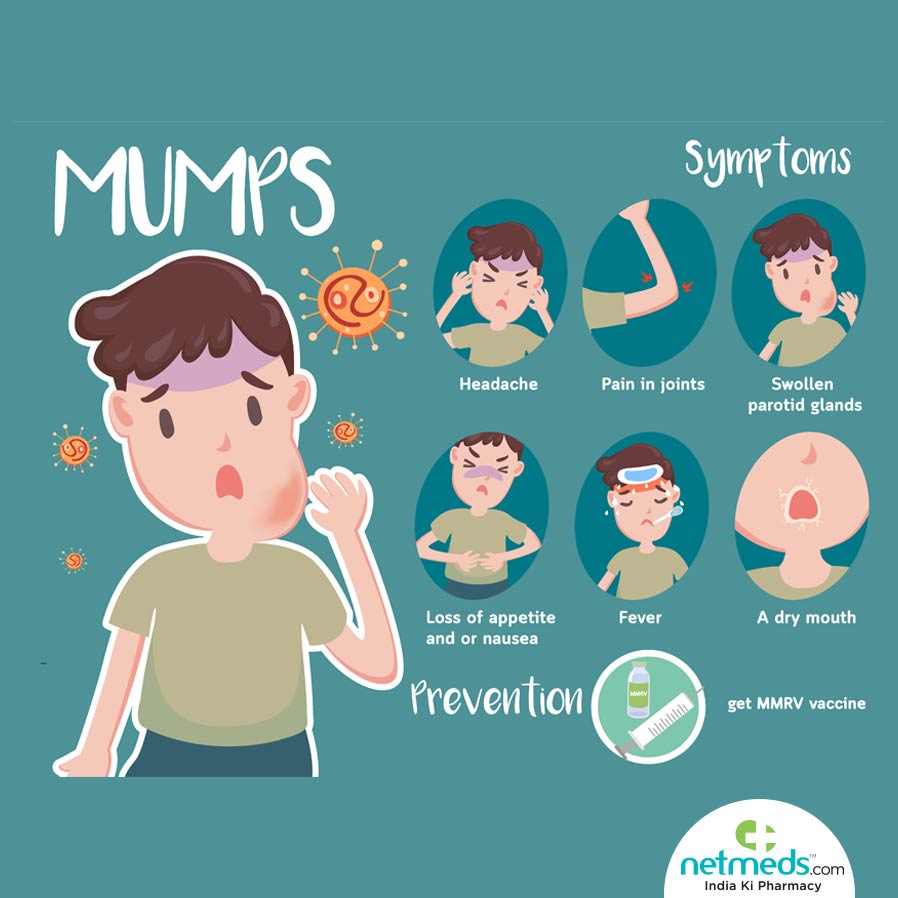
Mumps is an infectious disease caused by this disease virus, which belongs to a group of viruses called paramyxoviruses. The disease begins with mild symptoms such as headache, fever, and fatigue. But then it usually leads to severe inflammation of certain salivary glands (parotitis), which causes swelling of the cheeks and jaw.
Mumps used to be a very common disease in childhood. After this disease vaccine became available in 1967, the number of cases dropped significantly. However, these disease outbreaks still occur, especially among people who have been in close contact for a long time, such as on college campuses.
You can protect your child by getting the measles-this disease-rubella (MMR) vaccine.
Who does mumps affect?
Mumps usually affects children ages 2 to 12 who have not received this disease vaccine. However, teenagers and adults can still get this disease despite being vaccinated against it. This happens because the immunity to the vaccine decreases after many years.
Symptoms and causes
What are the symptoms of mumps?
The first symptoms of this disease are often mild. Symptoms also do not appear immediately. The incubation period (time between infection and illness) ranges from seven to 25 days.
Symptoms of mild mumps may include:
- fever
- Headache.
- muscle pain.
- Fatigue
- loss of appetite.
- After a few days, your parotid gland may become painfully swollen. The swelling, called parotitis, can occur on one or both sides of your face. Parotitis occurs in more than 70 percent of this disease cases.
It is important to remember that many different viruses and bacteria can cause parotitis. So it doesn’t always mean infection with this disease virus. Rarely, this disease can affect your organ parts, including your brain, pancreas, testicles, or ovaries. It usually only occurs in teenagers and adults, but call your child’s healthcare provider right away if he or she has any of the following severe symptoms:
High fever.
Stiffness in the neck.
Severe headache.
confuse
Stomach pain.
vomit
Visits
What causes mumps?
Mumps virus, a type of paramyxovirus, causes this disease. The virus spreads from person to person through direct contact with infected saliva or through respiratory droplets from an infected person’s nose, mouth, or throat.
Sneezing, coughing, or talking.
Sharing items containing infected saliva, such as toys, cups, and utensils.
Playing sports, dancing, kissing, or participating in other activities that involve close contact with others.
Certain groups of people are at higher risk of getting this disease. These groups include:
People with weakened immune systems.
People who travel internationally
Is mumps contagious?
Yes, mumps is a highly contagious viral infection. If your child has this disease, they are contagious from a few days before their glands swell up to five days after the swelling starts. They should not attend a school or take care of children. About a third of people with this disease have no symptoms, but can still be contagious.
Assessment and testing
How is mumps diagnosed?
Your child’s healthcare provider will ask questions about your child’s symptoms and perform a physical exam. They may be able to diagnose mumps based on the swollen salivary glands they see.
What tests are used to diagnose mumps?
your child’s healthcare provider may request a polymerase chain reaction (PCR) test to diagnose mumps. They will swab the inside of your child’s cheek or throat to take a sample of mucus. They will send the sample to a lab, where a pathologist will examine it and look for this disease virus. Your child’s provider may also request blood tests to help diagnose this disease or to rule out other conditions and viruses that can cause parotitis.
Management and treatment
How is mumps treated?
There is currently no cure for mumps, but the infection should clear up within 1 to 2 weeks. Treatment is used to relieve symptoms and includes: adequate bed rest and drinking water. Use of pain relievers, such as ibuprofen and paracetamol – Aspirin should not be give to children under 16 years of age. Rest is the best cure. There is little your doctor can do to speed recovery. But there are steps you can take to reduce pain and suffering and prevent others from being affect.
The main symptom of mumps is inflammation of the salivary glands, which causes swelling of the cheeks. Other signs and symptoms may include Swollen salivary glands on one or both sides of your face. Pain when chewing or swallowing. October 6, 2020. There is no specific treatment for this disease. The disease should run its course and usually resolves on its own within a few weeks. this disease treatment focuses on reducing your child’s symptoms to make them as comfortable as possible.
- Drink plenty of fluids.
- Gargle warm salt water.
- Eat soft, easy-to-chew foods.
- Suck on an ice pop to relieve a sore throat.
- Place ice or a heat pack on the swollen gland.

